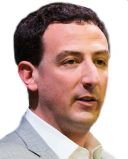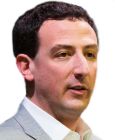
Leadership
Adam Grant On Leadership
Success lies in purpose, helpfulness, uncertainty, and resilience.
Posted September 25, 2017
Adam Grant is a highly distinguished professor of management and psychology at Wharton. He makes a rigorous, academic study of things like generosity and helping, meaningful work, leadership and culture, originality and non-conformity, work motivation, and success. He has published more than 60 articles in a wide range of academic journals. His groundbreaking ideas transcend academia—his work is universally relevant and important. It’s no surprise, then, that his work is also wildly popular. Professor Grant has written three New York Times bestselling books that have sold more than a million copies and been translated into 35 languages.
In this episode of Mastering Your Reality, Professor Grant and I discussed the topics below:
· As Douglas Adams wrote in Hitchhiker’s Guide to the Galaxy: "It is a well-known fact that those people who most want to rule people are, ipso facto, those least suited to do it." The leaders we want are those who are passionate about helping others—who are givers, not takers. Yet, the people who are motivated to get ahead and to be in charge tend to be takers. They tend to be more concerned about their career and less concerned about the overall success of the team or enterprise. Too often, they cannot be trusted to be loyal.
· There’s a “trying not to try” paradox: the very things people tend to do to achieve success as leaders can prevent them from being successful leaders. When we focus on helping others, however, very often we find success in leadership. With good reason; when we focus on helping others, we find greater motivation and meaning, we improve our knowledge and skills by learning about the diversity of issues others confront, and we build social capital within the organization.
· Bottom line: We all win, and our organizations do too when we create a culture in which givers thrive. But we’re bad at doing so.
· Problem: We equate confidence with competence. But they’re very different things. Indeed, unjustified confidence is a form of incompetence.
· Problem: We say that we want to foster cooperation, helpfulness, and compassion in our organization. But we measure only individual achievement or contribution and compensate on that basis. We should rigorously measure each team member’s contribution to the work of others—the extent of their helpfulness.
· This might be difficult to do, but it should be the goal. A great example of success: Corning, creator of Gorilla Glass (a product used in many smartphones and tablets), has a program to reward its top scientists with funded research labs for life. To qualify, you must be the lead author on a patent that drives at least $100 million in revenue. Many organizations would stop there, rewarding competent takers whose contributions might diminish once they “win” by earning tenure. But Corning then judges you on your contributions as a supporting author on others' patents. In this way, they identify the givers—the ones who share their insights and efforts to support the work of their colleagues. What is your organization’s version of being designated as a supporting author on someone else’s patent? That’s the question.
· The pressure on leaders to appear confident and all-knowing—to perpetuate the “illusion of certainty”—can suppress the introduction of new ideas and inhibit their exploration. At its worst, the illusion of certainty becomes a delusion of certainty that poses existential harms to an organization. Think about Blockbuster ignoring Netflix, for example, or Blackberry’s bet that smartphones would only be used for corporate purposes, or Polaroid’s insistence that people would always want a physical copy of their photographs.
· We must select and reward leaders willing to say: “I don’t have all of the answers. I’d like to make some business bets. Here’s my level of confidence for each option.”
· To succeed with this approach, leaders must learn to listen. The moment a leader starts to sketch out a position is the moment his or her team is likely to conform. Leaders must listen and ask questions first. The leader should speak last.
· What if companies had “mission questions” instead of mission statements? That might help change the perspective on leadership and certainty.
· Adam on working with Facebook’s Sheryl Sandberg to write Option B: “she Has the highest standards of anyone I’ve ever worked with.” Isaac on being Sheryl’s childhood neighbor: “Growing up in Miami, Sheryl and her family were our backdoor neighbors—the backs of our yards met. She, I’m sure, has no recollection of or interest in that factoid, but it’s very important to me.”
· Each of us is often unaware of how his or her support has deeply impacted others. But we build great strength and resilience by helping those around us. If we knew of all those moments in which others depended upon us and had been influenced by us, it would be a lot easier to know that we matter and to nurture strength within.
· Do you have to go through great adversity yourself to develop resilience—“post-traumatic growth”—or can you learn resilience from the insights of others—“pre-traumatic growth?” Often, there’s a gap between knowing and doing—between understanding how you “should” approach a problem and actually approaching it in that way. This gap is the issue. We can achieve pre-traumatic growth with discipline and practice.
· For example, there are many things we can do to bring gratitude into our lives and strengthen our connections with others, like thinking about the people who have made an impact in our lives, letting them know about it, and thanking them. We can be disciplined about this. Adam spent a week writing up these kinds of stories and sending them to those who’ve impacted his life. The experience engendered great pre-traumatic growth. It’s about adopting productive practices and sticking to them.
Want to learn more? Watch Adam's two TED Talks; check out his three New York Times bestselling books, Option B (2017), Originals (2016), and Give and Take (2013); or watch other episodes of Mastering Your Reality.



